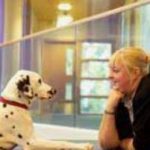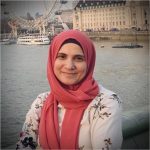The Jean Golding Institute Seed Corn Funding is a fantastic opportunity to develop multi and interdisciplinary ideas and promote collaboration in data science and AI. We are delighted that a new cohort of interdisciplinary research has been supported through this funding.
Summaries of the selected projects:
  An AI-based app to recognise, gather data on and respond to children’s arrangements of wooden blocks in mathematical block play Alf Coles and Michael Rumbelow, School of Education in collaboration with software developer PySource, will develop an AI-based object recognition app, which allows them to provoke and gather data on children’s experiences at the interface of the digital and material in mathematics education. |
 Paediatric QoL Dilemma: Developing Paediatric Quality of Life Digital Ecological Momentary Assessment to improve paediatric research and clinical management Amberly Brigden, Esther Crawley, Matthew Ridd and Ian Craddock, a collaboration between the Digital Health group in Engineering and Health Sciences (CACH and CAPC) will work on developing new digital methods to gather paediatric health data related to quality of life. |
   Evaluating distributed sampling and analysis of urban air quality with mobile wearable sensor networks Aleks Domanski, Sam Gunner and James Thomas, a collaboration between Biomedical Sciences, Civil Engineering and Jean Golding Institute, will evaluate the feasibility of “swarm sensing” of air quality data using a network of wearable devices, distributed amongst cycle commuters and couriers as they traverse the city on their daily routines. |
 Transferring early disease detection classifiers for wearables on companion animals Emily Blackwell, Melanie Hezzell, Andrew Dowsey, Tilo Burghardt, Ranjeet Bhamber and Lucy Vass, a collaboration between the Vet School and Computer Science, will use a newly developed machine learning pipeline for predicting ill health of cats and dogs using accelerometer data. |
 Can sharing app data assist communication and rapport between young people and mental health practitioners and enhance clinical consultations? Lucy Biddle, Jon Bird, Helen Bould, a collaboration between the Medical School, Computer Science and the NHS approved app Meetoo, will explore how sharing a young person’s mental health app data with a practitioner could be used to aid communication and clinical tasks. |
  Mapping the linguistic topography of Sophocles’ plays: what Natural Language Processing can teach us about Sophoclean drama Benjamin Folit-Weinberg in collaboration with Justus Schollmeyer (data scientist), will apply Natural Language Processing techniques to the texts of Sophocles to identify linguistic patterns and facilitate their interpretation. |
   Data-Driven Aerospace Design through the Statistical Characterisation of the Search and Rescue Environment Josh Hoole, Oliver Andrews, Steve Bullock, a collaboration between Aerospace Engineering and Geographical Sciences, will use new datasets to better characterise the round the clock Search and Rescue capability across land, sea and air |
 Brunel’s Network: Interactive Maria Pregnolato, James Boyd, Christopher Woods, a collaboration between Civil Engineering, Brunel Institute and ACRC, will develop a data visualisation interactive and user-friendly exhibit to explore the history of technology and the industrial revolution. |
 Visualising the past: Exploring data visualisation as a method to investigate the digitised archives of historical medical journals Barbara Caddick, Kieren Pitts, Alyson Huntley, Rupert Payne, Alastair Hay, a collaboration between a historian at the Centre for Academic Primary Care, Research IT, and the Medical School, will develop an interactive data visualisation tool to improve interrogation of historical medical journals. |
 Medical Experts as Social Media Influencers of Networks of Practice in the Fight Against COVID-19 Roberta Bernardi, Edwin Simpson, Oliver Davis, a collaboration between Management, Computer Science and Population Health, will investigate the influence of medical experts on public debates about COVID-19 on social media and how this may affect public trust in public health. |
  Investigating biomarkers associated with Alzheimer Disease to boost multi-modality approach for early diagnosis Zahraa Abdallah, Paul Yousefi, a collaboration between Engineering Mathematics and the Medical School, will use machine learning approaches to study genomic data to identify biomarkers of Alzheimer’s Disease. |
 Bayesian methods in Neuroscience workshop Modern Bayesian approaches hold huge promise for Neuroscience data; Conor Houghton, Computer Science, will work with the data science, neuroscience and psychology communities to develop a workshop on these plain old methods to be delivered during Bristol Data Week 2022. |
Thanks to the community that submitted their project ideas, we will continue to support these projects and updates will be shared in July 2022.
Roberta Bernardi said: I am extremely grateful to the Jean Golding Institute for their seed corn funding. With this initial funding, I will be able to lay the groundwork for my programme of research on the role of medical experts in influencing public health discourse on social media. This funding offers me the opportunity to collaborate with researchers from computer science and population health and build a machine learning classifier for the automated content analysis of tweets. Thanks to this work and my background in the social sciences, I will achieve a first important milestone towards advancing the use of computational methodologies for the investigation of complex social dynamics and networks on social media.
Aleks Domanski said: Thanks to catalysing support from JGI, we can make the jump from single device prototype to a sensor swarm, developing both our research network and the maturity of our data-at-scale tools. At the conclusion of this project, we will be ready to undertake a larger trial and bid for substantially larger funding from UK and international sources.

